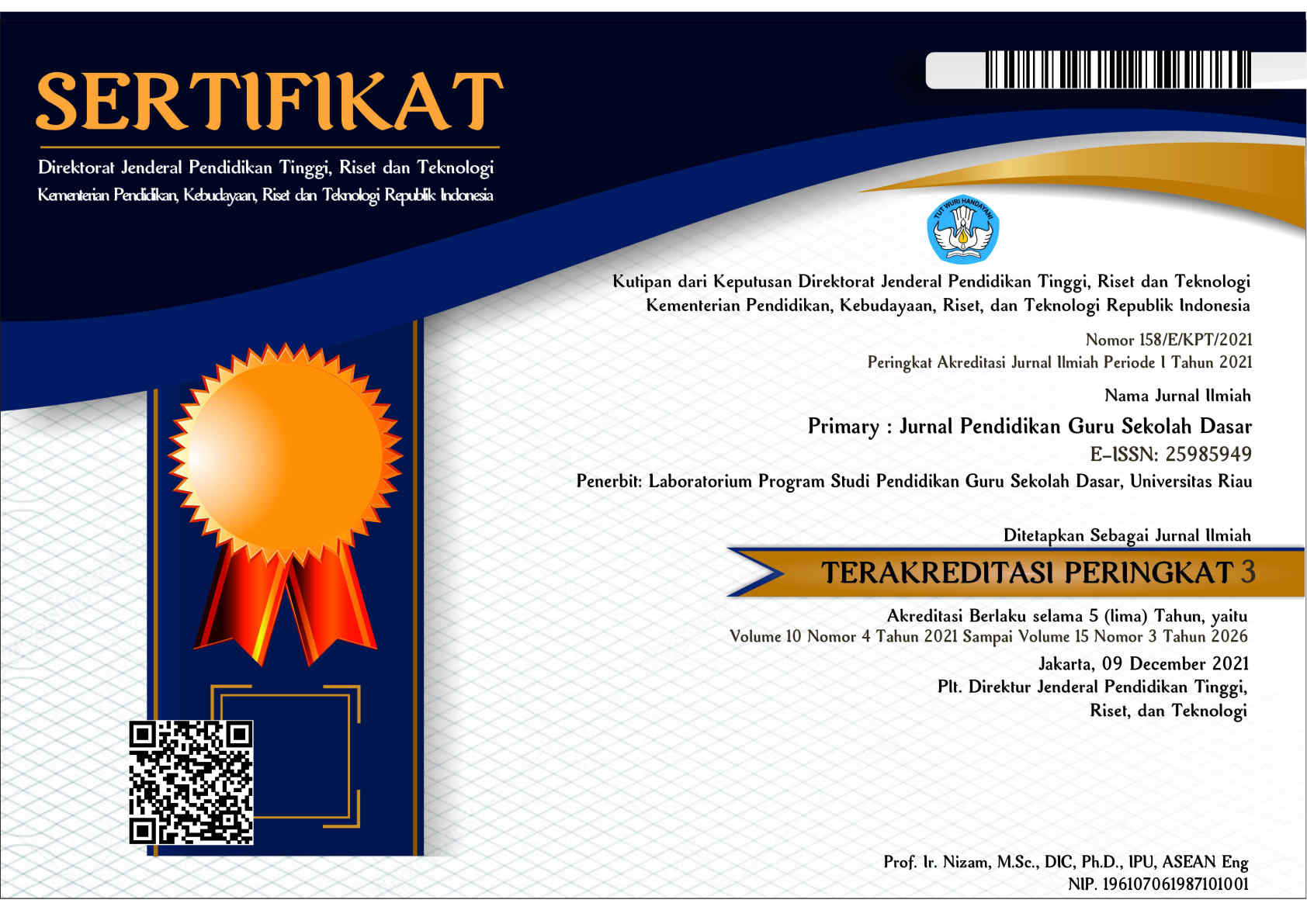KOMPETENSI GURU PADA DOMAIN FASILITAS PEMBELAJARAN BERBASIS PENDIDIKAN UNTUK PEMBANGUNAN BERKELANJUTAN
Abstract
Teachers are an important component in determining the learning process in Education for Sustainable Development (ESD). The second report of the teacher education project for ESD Asia – Pasific held on 17th – 19th September 2019 in Bangkok produced a competency framework for ESD teachers. This framework defines the competencies required by teachers to be involved in ESD which are implemented, developed, and evaluated by teacher education institutions. There are three domains in the teacher competency framework for ESD: facilitate learning, continue to learn and create, as well as connect, collaborate, and engage. However, this study only focused on one domain, which was learning facility. A total of 25 teachers from nine elementary schools provided their best answers based on the existing reality through a questionnaire distributed by the researchers about ESD-based teacher competence in the domain of lthe earning facility. This study aimed to determine the extent to which teachers understand and implement ESD-based competence in the domain of learning facilities in elementary schools. The data were processed with the rasch model through the winsteps application. The results of this study indicated that the teachers were able to implement it very well, but the idea was that the teachers still did not know that what they did led to ESD-based teachers' competence in the domain of learning facility.
Keywords
Full Text:
PDF (Bahasa Indonesia)References
Abdul, D., Lidinillah, M., Aprilia, M., Suryana, D., & Ahmad, A. B. (2020). Development of Creativity Instrument through Rasch Model Analysis. 8(4), 1620–1627. https://doi.org/10.13189/ujer.2020.080455
Glavic, P. (2020). Identifying key issues of education for sustainable development. Sustainability (Switzerland), 12(16). https://doi.org/10.3390/su12166500
Hasan, R. (2015). Pengaruh Masa Kerja Dan Pendidikan Guru Terhadap Kinerja Guru Sdn Sukabumi 10 Kota. Jurnal Penelitian Dan Pendidikan IPS (JPPI), 9(2), 1219–1230. ejournal.unikama.ac.id/index.php/JPPI/article/view/1664
Hoffmann, T., & Siege, H. (2018). What is Education for Sustainable Development (ESD)? Human Development, 1(8), 1–6. http://www.esd-expert.net/files/ESD-Expert/pdf/Was_wir_tun/Lehr- und Lernmaterialien/What_is_Education_for_Sustainable_Development.pdf%0Ahttp://www.esd-expert.net/teaching-and-learning-materials.html
Jagtap, P. (2016). Teachers role as facilitator in learning. Scholarly Research Journal, 3(17), 3903–3905.
Japan National Commission for UNESCO. (2016). A Guide to Promoting ESD (Education for Sustainable Development). March, 49. http://www.mext.go.jp/component/english/__icsFiles/afieldfile/2016/11/21/1379653_01_1.pdf
Mustadi, A., & Senen, A. (2018). Pendidikan Sekolah Dasar. http://library1.nida.ac.th/termpaper6/sd/2554/19755.pdf
Poekert, P. (2011). The pedagogy of facilitation: Teacher inquiry as professional development in a Florida elementary school. Professional Development in Education, 37(1), 19–38. https://doi.org/10.1080/19415251003737309
Priatna, B. A. (2008). Instrumen penelitian. 3(November), 1–22.
Rahmawati, M., & Suryadi, E. (2019). Guru sebagai fasilitator dan efektivitas belajar siswa. Jurnal Pendidikan Manajemen Perkantoran, 4(1), 49. https://doi.org/10.17509/jpm.v4i1.14954
Sagitaningrum, D., & Frisko, D. (2016). Corporate Social Responsibility: Keterkaitan Letak Geografis Terhadap Desain Program dan Pelaporan Perusahaan. Jurnal Ekonomi Dan Bisnis, 18(3), 43. https://doi.org/10.24914/jeb.v18i3.283
Sumintono, B., & Widhiarso, W. (2013). Aplikasi Model Rasch Untuk Penelitian Ilmu-Ilmu Sosial.
Sumintono, B., & Widhiarsono, W. (2015). Aplikasi Pemodelan Rasch pada Assessment Pendidikan (Bambang Trim (ed.); I). Trim Komunikata.
UNESCO. (2017). Education for Sustainable Development Goals Learning Objectives.
UNESCO. (2018). Integrating Education for Sustainable Development (ESD) in Teacher Education in South-East Asia. http://library1.nida.ac.th/termpaper6/sd/2554/19755.pdf
UNESCO. (2020). Guide for the Effective Dissemination of the Asia-Pacific ESD Teacher Competency Framework.
DOI: http://dx.doi.org/10.33578/jpfkip.v10i5.8321
Refbacks
- There are currently no refbacks.
Copyright (c) 2021 Mia Azzahra, Ghullam Hamdu

This work is licensed under a Creative Commons Attribution-NonCommercial-ShareAlike 4.0 International License.
____________________________________________________________
Primary: Jurnal Pendidikan Guru Sekolah Dasar
Secretariat
Program Studi Pendidikan Guru Sekolah Dasar
Gedung B1, FKIP Universitas Riau
Kampus Bina Widya Km. 12,5 Simpang Baru Panam
Pekanbaru Riau Indonesia 28293
e-mail : primary@ejournal.unri.ac.id



